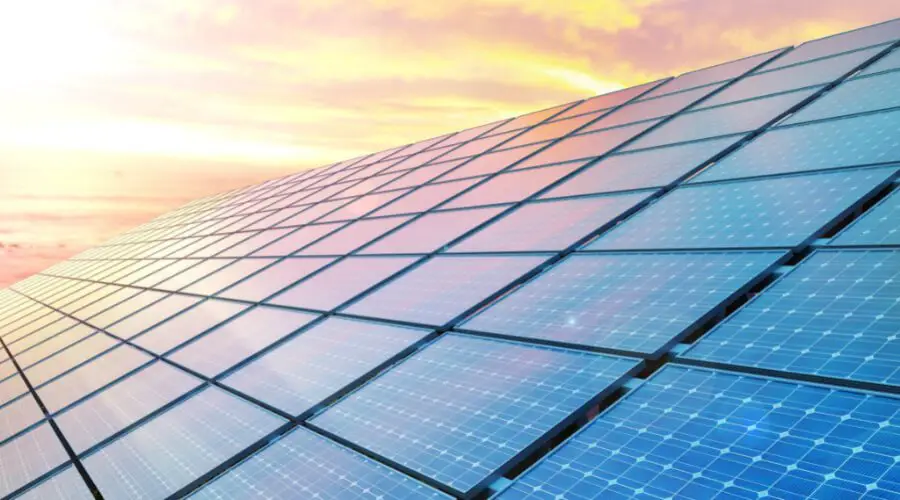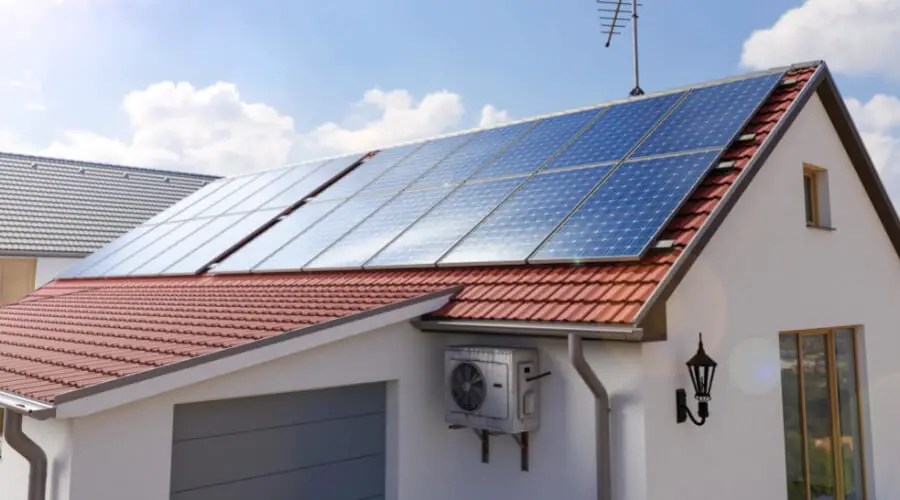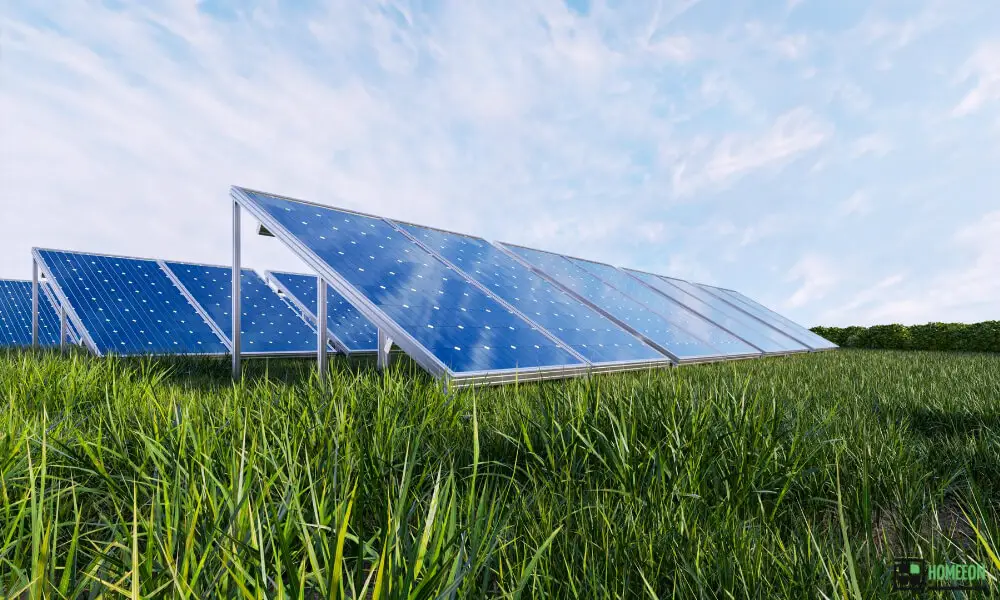Last Updated on July 19, 2023 By Emma W. Thomas
Solar panels do not attract lightning, as they are not good conductors of electricity. Instead, lightning strikes prefer taller and better conductive objects, such as trees or metal structures. However, if solar panels are installed on a building, they can provide a potential pathway for lightning to follow if a strike occurs nearby.
Do Solar Panels Attract Lightning? (Myth Or A Fact?)
Solar panels have become increasingly popular as a renewable energy source due to their ability to convert sunlight into electricity. However, some concerns have been raised about whether solar panels attract lightning strikes. This question has led to various opinions and debates among experts and homeowners alike. So, let’s examine the truth behind this question and determine whether it is a myth or a fact.
Myth: Solar panels attract lightning strikes
One common belief is that solar panels act as lightning rods and attract lightning strikes. The idea of having a metal structure on your roof might seem like a magnet for lightning, but in reality, it is not as simple as that. Solar panels are made of materials like silicon, glass, and aluminum, which are not inherently attractive to lightning. Lightning does not have a preference for striking solar panels specifically.
Fact: Solar panels can indirectly mitigate lightning damage
While solar panels do not attract lightning strikes directly, they can play a role in reducing the damage caused by a lightning strike. Solar panels are typically connected to the building’s electrical system through an inverter. This inverter often includes surge protection mechanisms designed to safeguard against power surges caused by lightning strikes. This means that when lightning strikes nearby, the surge protection system can help divert the excessive surge of electricity away from the building’s electrical system, potentially reducing the risk of damage.
It is worth noting that if lightning were to strike directly on a solar panel, the panel itself could be damaged. However, this is a rare occurrence due to the extensive grounding systems used in modern installations. Additionally, solar panels are rigorously tested and built to withstand extreme weather conditions, including lightning strikes.
What Causes Lightning?
For lightning to strike, some things that have to come into play. Lightning begins as a static charge within the clouds. The imbalance between the storm clouds and the ground, or even between the clouds themselves, causes the static charge.
Most times, imbalance happens within the clouds and causes lightning to occur. Rarely does an imbalance between the clouds and the ground lead to lighting, but it does happen.
Lightning is usually hot. When it strikes, it can heat the air around it to temperatures higher than the sun’s surface. The heat produced by the lightning causes the air around that part to rapidly expand, vibrate and cause the thunder that we hear after lightning strikes.
What Attracts Lightning?
The myths and misconceptions around lightning have existed for a long time. We have all heard one or two very believable myths.
Mainly, lightning is attracted to the clouds and the ground. If you are in a thunderstorm walking around, lightning may strike you. However, this has nothing to do with what you are doing or wearing.
Lightning is electricity. When it is sparked in the clouds, it just wants to be grounded or have its electric charges neutralized. How or where it gets to be grounded is not something that can be determined or calculated.
People struck by lightning have described having felt a tingling sensation and then feeling their hair stick up on its ends. If you get this feeling when walking in a storm, it is advisable to seek shelter.
Lightning has no specific pattern or point of contact; it can strike any place at any moment. However, the location of the storm can narrow down where it is most likely to strike.
Types Of Lightning
There are just two types of lightning that can occur.
- Cloud-to-cloud lightning
- Cloud-to-ground lightning
Cloud-to-cloud lightning happens inside the clouds when there is a static buildup. It is the most common, and the lightning never touches the ground. You can see it in the clouds as it streaks through with a bright light.
Cloud-to-ground lightning happens when there is an imbalance between the clouds and the ground. The cloud-to-ground lightning occurs when the clouds are nearer to the ground, and the imbalance of ions between the two happens. The static energy charges up and causes the lightning, which heads to the earth, to get grounded or neutralized.
Do Metallic Solar Panel Components Attract Lightning?

Lightning does not have a specific material attracted to more than other materials. It can strike anything in its way. In past occurrences, lightning has been seen striking oceans, trees, homes, mountains, and all other sorts of materials.
However, lightning rods are metallic. Metal is used because metallic items are more appropriate for conducting electricity with minimal resistance.
Lightning rods are placed at a higher point. You do this to ensure that the lightning rods are the first thing that the lightning strikes. They help minimize the damage that lightning would have caused to your house if it was not guided safely into the group.
Does The Electricity In Solar Panel Equipment Attract Lightning?
Lightning strikes areas that have an electrical charge. Solar panels collect light and heat from the sun and make electrical energy. They do not have an electrical charge around them.
Therefore, the electricity collected by solar panels cannot be a factor in attracting lightning to your house.
How To Protect Your House Or Solar Panels From Lightning Strikes

There are various ways to cope with lightning strikes if your area is prone to their occurrence.
Some include:
Installation Of Lightning Rods
Lightning rods create a low-resistance path for the lightning to follow. The lighting is directed into the ground, and it does not damage your home, equipment or harm the occupants.
To protect your house, you need to attach lightning rods to it and have the attached cables running down to grounding electrodes. This way, you will protect your equipment, home occupants, and home from the effects of lightning strikes.
When installing lightning rods, you should ensure that they are not near your solar panels, as this will reduce their effectiveness. You can install the lightning rod on one end of your home and install your solar panels on the other end.
Before installing lightning rods, you must consult your state’s zoning laws and know if you are breaking any laws by installing them.
Installation Of Voltage Surge Protectors
Voltage surge protectors are connected to your equipment, mostly electronic equipment, to regulate the voltage that gets to them
During storms, lightning may strike your home, and use the connected devices to find a path to get grounded through. This is where the voltage surge protectors come in. They help reduce the excess amount of power that would have destroyed your electric equipment to a small dose that will not harm them.
Check And Have A Valid Insurance
If you live in areas prone to lightning strikes, it’s advisable to have an insurance cover that covers the risk.
Installation of other lightning protection measures is not always a sure deal. The best is to ensure you are covered by an insurance company that will help replace any destroyed equipment. A cover is a reasonable measure that ensures you are not at a total loss when lightning strikes. However, some insurance will also need other lightning protection measures to minimize the damage.
Unplugging Electrical Appliances
You can unplug some common household appliances during storms to avoid any risks that might come by if there is a lightning strike.
Should Solar Panels Be Grounded?
Though solar panels do not attract lightning, they can be hit and damaged like any other structure. Both indirect and direct lightning strikes can damage or result in solar panel downtime. Indirect strikes are common, and when they happen, they induce high voltage to solar panels, damaging their components or causing fire hazards.
On the other hand, direct strikes are rare, and if it happens, they can melt inverters and panels.
Therefore, there is a need to ground your solar panels properly as a preventive measure.
You should install a grounding rod several feet into the ground and connect it to the wire attached to the metal racking of your solar panel. This ensures that if lightning strikes your home, the surge will bypass your solar panels and get safely discharged into the ground. A grounding rod is also important in preventing the accumulation of static electricity in your solar equipment.
What To Do After Your Home Has Been Struck By Lightning.
If your home has been struck by lightning, it is advisable to call 911. You should do this even if no one has been hurt or no signs of a fire. You should also avoid using any electronic devices in your house.
What happens if lightning hits a solar panel?
If lightning strikes a solar panel, it can have varying effects depending on the intensity and path of the lightning bolt. While solar panels are designed to withstand adverse weather conditions, lightning can still pose a risk to their functionality. Here are some possible scenarios of what could happen if a solar panel is struck by lightning:
- Complete destruction: In the worst-case scenario, a direct lightning strike can cause significant damage to the solar panel, rendering it completely useless. The intense heat and power associated with lightning can melt or vaporize the delicate components of the panel, leading to irreparable damage.
- Partial damage: Sometimes, lightning may not directly hit the solar panel but strike somewhere nearby. In such cases, the high voltage surge generated by the lightning can still induce electrical currents in the wiring of the solar panel system, damaging the electronic components. This can result in partial or intermittent loss of power production.
- Surges and overloading: Lightning carries an enormous amount of electrical energy, and if it strikes in proximity to a solar array, it can produce a high surge of electricity. These sudden power surges can overload the inverter or other system components, potentially causing them to trip or malfunction. This can disrupt the normal functioning of the solar panel system.
- System shutdown: Solar panel systems are equipped with protective devices such as surge arrestors, fuses, or circuit breakers to safeguard against electrical surges. In the event of a lightning strike, these protective mechanisms can automatically trip, disconnecting the solar panel system from the main electrical circuit. This shutdown is a safety measure to prevent damage to the system and protect against electrical hazards.
Final Thoughts
Solar panels do not have any electrical charge around them; they are just used to convert light and heat from the sun into electricity. Lightning requires an electrical charge to connect to. Therefore, solar panels do not attract lightning at all. You can safely live with them installed on top of your house and not fear that lightning will strike your home. However, it is advisable to take the protective measures we have highlighted above for places prone to lightning.
References:
https://www.conserve-energy-future.com/do-solar-panels-attract-lightning.php
https://architreecture.com/do-solar-panels-attract-lightning/
Emma is a graduate of Domestic Science or Family and Consumer Sciences (Home Economics) from the University of Wisconsin. She has 7 years of experience Working with the strategic section of BestBuy and now writing full-time for Homeeon.
From Managing the Home, Interiors, Cleaning, and Exteriors to Gardening and everything about Making A Home Liveable – is her passion and this Homeeon is the result of this.
Emma loves decorating her home with the best stuff found online. She cares about quality over anything and writes reviews about them here in Homeeon. Get in touch with her over Pinterest.
Keep reading her blogs.

